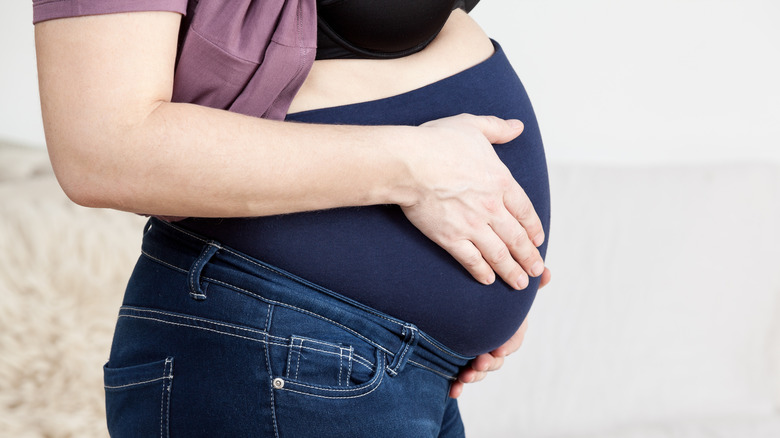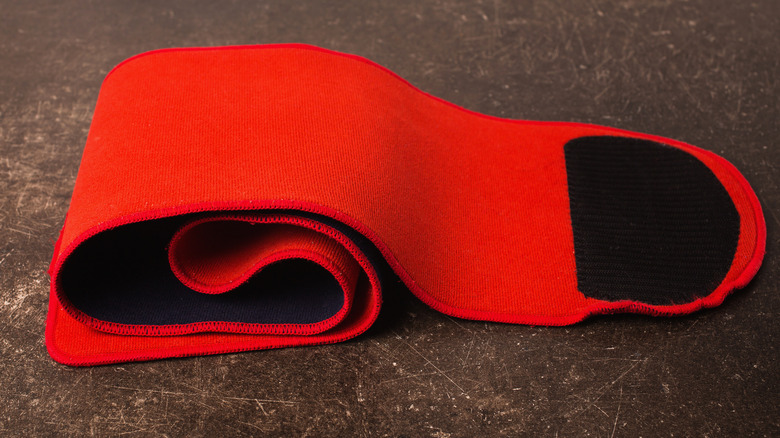How Belly Bands Can Help You During Pregnancy
We may receive a commission on purchases made from links.
Pregnancy is supposed to be a time of joy and happiness, but it often comes with unexpected challenges. Many women experience morning sickness, backaches, constipation, breakouts, and everything in between during the nine-month term. While it's possible to minimize the appearance of pregnancy acne or stretch marks, back pain is a whole different ball game.
This problem affects up to 60% of moms-to-be, including those who didn't have back issues before getting pregnant. In some cases, it can persist for months or even years after childbirth, according to clinical research published in the Journal of Personalized Medicine. Moreover, its symptoms can be so severe that you may have trouble sleeping, working, or even moving around.
One way to manage your back pain during pregnancy is to wear belly bands. These garments support the core and lower back muscles, making it easier to stay active. You may also use them after giving birth to speed up postpartum recovery. "A belly band can help provide some stability. Sometimes, they can help you feel more supported or help you with your posture," said OB-GYN Erica Newlin, MD (via the Cleveland Clinic).
However, not all belly bands are created equal — and what works for one pregnant person may not work for another. With that in mind, here's what you should know about these supportive garments and how to choose the one that best meets your needs.
What's the purpose of a belly band?
Belly bands are very similar to back braces, as they both support the spine and lower back muscles while helping maintain good posture. The difference is that pregnancy bands can stretch to accommodate your baby bump, providing gentle compression. Belly belts serve the same purpose, but they are narrower and more rigid, as Premier Health explains.
Also known as belly sleeves or wraps, pregnancy bands can help to reduce the pain and discomfort that keep you from staying active. These garments appear to be particularly effective for women with lower back or pelvic girdle pain, according to clinical evidence presented in the Journal of Pregnancy. With regular use, they may improve physical function, mobility, and balance, decreasing the risk of falls.
Experts also note that belly bands help lift the uterus, which can reduce the pressure on the pelvic floor and lower back. However, contrary to what certain manufacturers claim, the bands are unlikely to protect against daily radiation, microbes, and other environmental factors, according to the above review. What they can do is help you feel more comfortable as your belly grows, allowing for increased mobility.
Are pregnancy belly bands worth it?
These accessories can be worn during pregnancy and postpartum to keep your spine in alignment and alleviate aches. When you're carrying a baby, your growing belly causes your center of gravity to shift forward, which in turn may affect your posture and gait. This process can result in lower back pain, knee hyperextension, muscular imbalances, and leg cramps, according to a recent review published in the International Journal of Environmental Research and Public Health.
Pregnancy belly bands help your body to cope with these changes, reducing muscle and joint pain. The American College of Obstetricians and Gynecologists also recommends wearing these garments during exercise to feel more comfortable overall. The research is mixed, though. For example, a 2009 review featured in the Journal of Clinical Nursing says there's not enough evidence to support their use for back pain relief.
Some studies found that belly bands and belts can indeed reduce backaches and pelvic pain while improving functional mobility, reports the Journal of Pregnancy. But, as the researchers note, these garments may be more or less effective depending on their design, the level of compression, and the materials used. Also, it's worth mentioning that some models may cause skin irritation, soreness, itching, poor circulation, allergic reactions, and other problems.
What you should know before buying a belly band
Pregnancy bands should be worn tightly around the belly to provide optimal support. The problem is that using them for too long at a time can affect circulation, digestion, and even breathing, warns SRC Health. For example, many women experience heartburn while pregnant— and wearing a belly band for hours on end could make you feel even worse. To stay safe, use these garments for no more than two or three hours per day.
As a rule of thumb, choose a belly band that fits comfortably around your bump. If it's too tight, it will limit your range of motion. In the worst-case scenario, it may even affect your unborn baby. Also, try to learn more about the different types of pregnancy bands before you pick one. Lindsey Vestal, a pelvic floor therapist, recommends the Cabea Baby Belly Band. "This is a good one for those having groin pain, back, hernia, and pelvic-floor pain," she told The Strategist.
If you prioritize comfort, you'd be better off wearing a pregnancy support brace, such as those from NEOtech Care, says certified labor doula Megan Davidson, Ph.D. Other models are designed to fit seamlessly under your clothes but may not offer the same level of support as traditional belly bands or belts. Alternatively, you could choose a simple band for everyday wear and a more structured one for increased back support.



